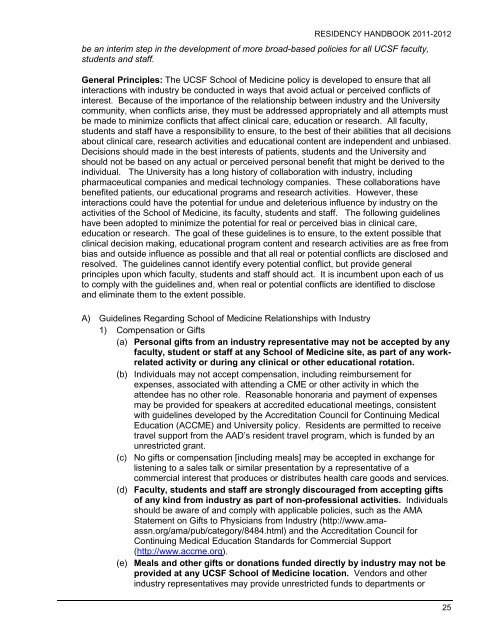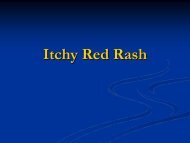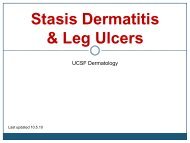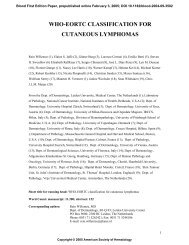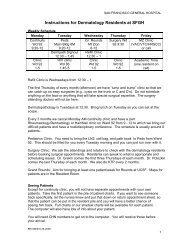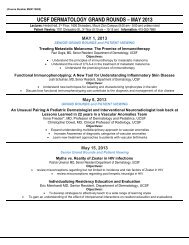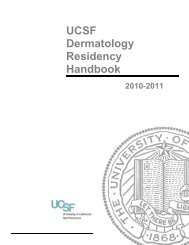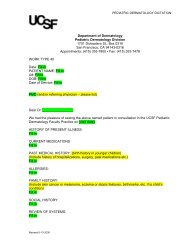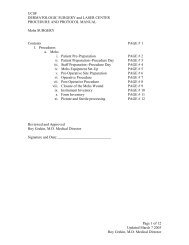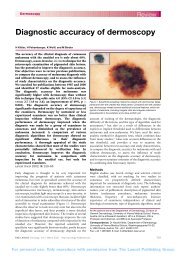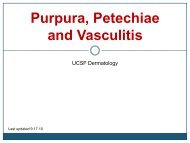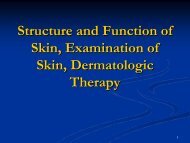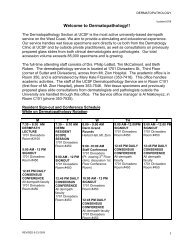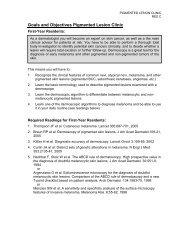UCSF Dermatology Residency Handbook - Dermatology - University ...
UCSF Dermatology Residency Handbook - Dermatology - University ...
UCSF Dermatology Residency Handbook - Dermatology - University ...
Create successful ePaper yourself
Turn your PDF publications into a flip-book with our unique Google optimized e-Paper software.
RESIDENCY HANDBOOK 2011-2012<br />
be an interim step in the development of more broad-based policies for all <strong>UCSF</strong> faculty,<br />
students and staff.<br />
General Principles: The <strong>UCSF</strong> School of Medicine policy is developed to ensure that all<br />
interactions with industry be conducted in ways that avoid actual or perceived conflicts of<br />
interest. Because of the importance of the relationship between industry and the <strong>University</strong><br />
community, when conflicts arise, they must be addressed appropriately and all attempts must<br />
be made to minimize conflicts that affect clinical care, education or research. All faculty,<br />
students and staff have a responsibility to ensure, to the best of their abilities that all decisions<br />
about clinical care, research activities and educational content are independent and unbiased.<br />
Decisions should made in the best interests of patients, students and the <strong>University</strong> and<br />
should not be based on any actual or perceived personal benefit that might be derived to the<br />
individual. The <strong>University</strong> has a long history of collaboration with industry, including<br />
pharmaceutical companies and medical technology companies. These collaborations have<br />
benefited patients, our educational programs and research activities. However, these<br />
interactions could have the potential for undue and deleterious influence by industry on the<br />
activities of the School of Medicine, its faculty, students and staff. The following guidelines<br />
have been adopted to minimize the potential for real or perceived bias in clinical care,<br />
education or research. The goal of these guidelines is to ensure, to the extent possible that<br />
clinical decision making, educational program content and research activities are as free from<br />
bias and outside influence as possible and that all real or potential conflicts are disclosed and<br />
resolved. The guidelines cannot identify every potential conflict, but provide general<br />
principles upon which faculty, students and staff should act. It is incumbent upon each of us<br />
to comply with the guidelines and, when real or potential conflicts are identified to disclose<br />
and eliminate them to the extent possible.<br />
A) Guidelines Regarding School of Medicine Relationships with Industry<br />
1) Compensation or Gifts<br />
(a) Personal gifts from an industry representative may not be accepted by any<br />
faculty, student or staff at any School of Medicine site, as part of any workrelated<br />
activity or during any clinical or other educational rotation.<br />
(b) Individuals may not accept compensation, including reimbursement for<br />
expenses, associated with attending a CME or other activity in which the<br />
attendee has no other role. Reasonable honoraria and payment of expenses<br />
may be provided for speakers at accredited educational meetings, consistent<br />
with guidelines developed by the Accreditation Council for Continuing Medical<br />
Education (ACCME) and <strong>University</strong> policy. Residents are permitted to receive<br />
travel support from the AAD’s resident travel program, which is funded by an<br />
unrestricted grant.<br />
(c) No gifts or compensation [including meals] may be accepted in exchange for<br />
listening to a sales talk or similar presentation by a representative of a<br />
commercial interest that produces or distributes health care goods and services.<br />
(d) Faculty, students and staff are strongly discouraged from accepting gifts<br />
of any kind from industry as part of non-professional activities. Individuals<br />
should be aware of and comply with applicable policies, such as the AMA<br />
Statement on Gifts to Physicians from Industry (http://www.ama-<br />
assn.org/ama/pub/category/8484.html) and the Accreditation Council for<br />
Continuing Medical Education Standards for Commercial Support<br />
(http://www.accme.org).<br />
(e) Meals and other gifts or donations funded directly by industry may not be<br />
provided at any <strong>UCSF</strong> School of Medicine location. Vendors and other<br />
industry representatives may provide unrestricted funds to departments or<br />
25


